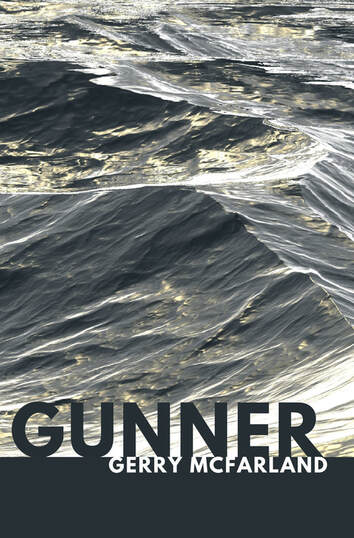Gunner: Poetry by Gerry McFarland

In these poems, Gerry McFarland recounts his experiences as a Navy Gunner during the Vietnam War.
The sea is beautiful and merciless, it can kill you. In Gunner this is what Gerry McFarland makes me experience: what it feels like being in a diminishing space somewhere between both curving dark ends of the world, where existence on a naval ship is a continual cycle of the mundane broken by flashes, intense moments, when life-saving decisions are made. McFarland intimately knows deployment; he knows that caring for a fifty-caliber machine gun is a maintenance ritual which is equivalent of the tedious cleansing of a sailor's soul when at sea, and it is also the sailor equivalent of being in port.
-Gary Copeland Lilley, author of The Bushman's Medicine Show
The enemy is always invisible," Gunner is told by his Captain. "Brace yourself...." In Gerry McFarland's latest book, Gunner is constantly on alert for enemy fire, while at the same time fighting the inner battles of a young man confronted with all the incongruities of war. Gunner gets his sea legs, not only on the USS King, but in life, as he learns to hang on, keep his mouth shut, and "lean into the curve of the earth."
-Linda Malnack, author of 21 Boxes and editor at Switched-on Gutenberg and Crab Creek Review.
Gerry McFarland's Gunner is a powerful chapbook about war, disillusionment, and survival. Many images evoke a surreal feeling: "I no longer saw the light and dark of things" and "Burned mates stumble forward choking...." Other poems show the boredom of painting a destroyer's "angled fantail stripe" over and over. Gunner hears a war protester call him a "Baby Killer"-Whatever, says Gunner. He hangs out in bars, and his friend falls in love with a go-go dancer. In one poem, Gunner apologizes for not shooting; in another, he tries to die. He hears the ocean's "swells whisper like angels," and the tragedy of Vietnam is re-enacted. This skillful book has both immediacy and the right distance. It feels authentic.
-Richard Widerkehr, author of At the Grace Cafe and In the Presence of Absence.
The sea is beautiful and merciless, it can kill you. In Gunner this is what Gerry McFarland makes me experience: what it feels like being in a diminishing space somewhere between both curving dark ends of the world, where existence on a naval ship is a continual cycle of the mundane broken by flashes, intense moments, when life-saving decisions are made. McFarland intimately knows deployment; he knows that caring for a fifty-caliber machine gun is a maintenance ritual which is equivalent of the tedious cleansing of a sailor's soul when at sea, and it is also the sailor equivalent of being in port.
-Gary Copeland Lilley, author of The Bushman's Medicine Show
The enemy is always invisible," Gunner is told by his Captain. "Brace yourself...." In Gerry McFarland's latest book, Gunner is constantly on alert for enemy fire, while at the same time fighting the inner battles of a young man confronted with all the incongruities of war. Gunner gets his sea legs, not only on the USS King, but in life, as he learns to hang on, keep his mouth shut, and "lean into the curve of the earth."
-Linda Malnack, author of 21 Boxes and editor at Switched-on Gutenberg and Crab Creek Review.
Gerry McFarland's Gunner is a powerful chapbook about war, disillusionment, and survival. Many images evoke a surreal feeling: "I no longer saw the light and dark of things" and "Burned mates stumble forward choking...." Other poems show the boredom of painting a destroyer's "angled fantail stripe" over and over. Gunner hears a war protester call him a "Baby Killer"-Whatever, says Gunner. He hangs out in bars, and his friend falls in love with a go-go dancer. In one poem, Gunner apologizes for not shooting; in another, he tries to die. He hears the ocean's "swells whisper like angels," and the tragedy of Vietnam is re-enacted. This skillful book has both immediacy and the right distance. It feels authentic.
-Richard Widerkehr, author of At the Grace Cafe and In the Presence of Absence.

Gerry McFarland worked in bush-bean picking, carpentry, and sheet metal before serving in the US Navy, 1968-72. He served as gunner’s mate on the USS King. His interests since have evolved into writing, psychology and education. He was associate editor at Floating Bridge Press 2011-2018, taught at University of Phoenix and Edmonds Community College. He graduated from Antioch University Seattle with a Master’s in Psychology and an MFA in Creative Writing from the Rainier Writing Workshop. His first full collection of poems, The Making, was published by Cave Moon Press in 2019. His work has appeared in Bellowing Ark, Contemporary American Voices, Crab Creek Review, Crucible, Limestone, Meridian Anthology of Contemporary Poetry, Pacific Northwest Magazine, Sanskrit, Switched-on Gutenberg, Zyzzyva, and the anthology Detours: Poems of Travel by Land, Air, Sea, and Mind. Gunner is Gerry's second poetry collection, due out in Spring 2021.